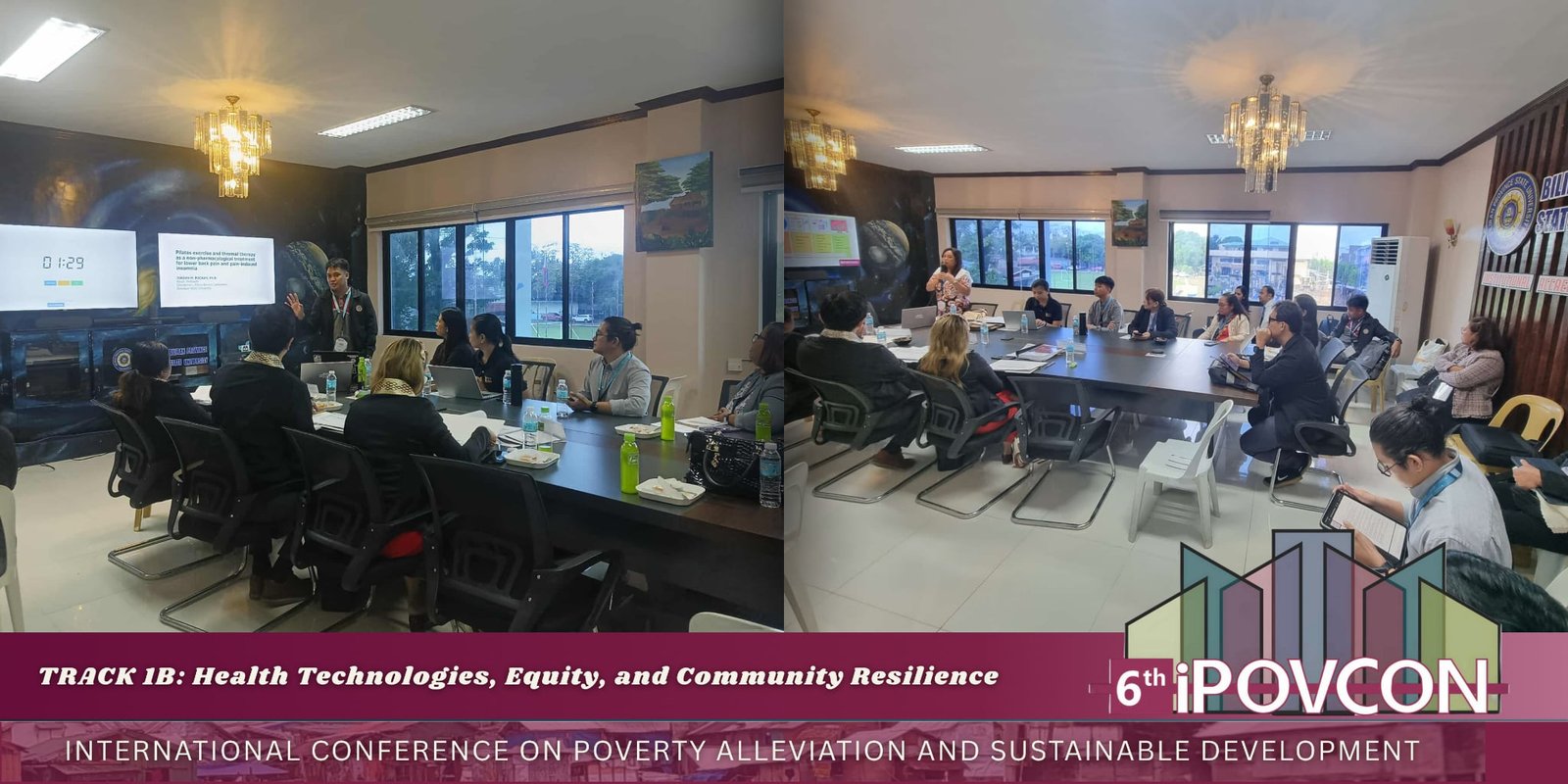NAVAL, BILIRAN, Philippines—This year’s iPOVCON Track 1: Emerging Technologies for Health and Education Equity also featured Subtrack 1B: Health Technologies, Equity, and Community Resilience with a total of 24 paper presentations.
The session featured innovative research from educators, health practitioners, and development professionals who have presented evidence-based studies that promote health inclusivity, resilience, and sustainable community well-being.
The subtrack includes the presentation of Farrah Mae C. Sombilon from the University of the Immaculate Conception, who presented “Tied by Blood, Bridged Through Purpose: Leadership Narratives of Middle Administrators in Second-Generation Family-Owned Schools.” Following her was Ma. Victoria D. Naboya of Leyte Normal University, who discussed “Too Many Hats to Wear: Exploring How Excessive and Mismatched Workloads Affect Teaching Quality.”
The theme of technological integration in healthcare education was advanced by Keziah E. Baldoza, Charisse D. Bugas, Jefferson P. Carpio, Seth Bernice M. Lajato, Katherine Clare D. Patrocinio, Khatreen Kaye M. Sieras, Adrienne Dominique A. Sy, Matthe Ivan Ariston R. Teves, Marielle P. Vilando, and Justine Claire D. Villanueva of Silliman University with their collaborative paper, “Understanding Influences, Practices, Advantages, and Challenges of Artificial Intelligence Use in Nursing Education.” Marco L. Espinosa of Sorsogon State University examined academic persistence and systemic support through his paper, “Working Students and Academic Resilience: A Systematic Review of Challenges, Institutional Support, and Pathways to Success in Free High Standard Education.”
In another set, Manuela Cecille G. Vicencio and Aaliyah DG. Mapa of the University of Eastern Philippines discussed “Characterization and Anti-Inflammatory Activity of Klabo (Coleus aromaticus Benth) Herbal Gummy Candy.” Derren N. Gaylo, Anna Wilda C. Tado, and Brian Gillikin from Bukidnon State University evaluated community engagement and public communication in “Evaluating Public Feedback on the ‘Share to Heal’ Program’s Efforts in Combating the Philippine Infodemic.”
Meanwhile, Christine Joy B. Cainday of Bukidnon State University presented “Exploring the Barangay Health Centers’ Delivery of Family Planning Information, Education, and Communication (IECs) for Indigenous People.” Sherlyne Anne C. Burreres, Zyra Nina C. Cabugayan, Zeimon Abijah M. Monsanto, and colleagues from UP Tacloban College delved into behavioral health dynamics with “Fear, Beliefs, and Gender in Health Crisis Response: A Moderation Analysis of Vaccine Acceptance Toward Strengthening Disaster Resilience in the Philippines.” Sheena Mae L. Ochea from the Palompon Institute of Technology followed with “First Aid Knowledge and Practices: Basis for a Community-Based Training Aligned with Standards of Training, Certification, and Watchkeeping,” underscoring health capacity building at the community level.
Addressing public health and occupational challenges, Ernesto D. Doloso Jr. from Central Bicol State University of Agriculture discussed “Gender-Inclusive and Culturally Sensitive Disaster Preparedness, Mitigation, Response, and Recovery Plans for an Agta Community in the Philippines.” Efren I. Balaba and Christian C. Varquez of Southern Leyte State University explored creative pedagogy in “HarmonyFocus: A Music-Infused Learning Platform for Enhanced Concentration and Retention in Academic Studies.”
The succeeding presentations included Ma. Zandra Bonnine V. Salcedo of Camarines Sur Polytechnic Colleges with “Mindfulness and Self-Efficacy in Predicting Academic Performance,” and Herbert M. Fabillar of Northwest Samar State University, who addressed workplace well-being through “Occupational Stressors of Teachers in the Department of Education Calbayog City Division.”
Israel P. Penero, Belen E. Bagui, and Therezia O. Conti from Batangas State University shared their research “Perception of the Quality of Life After Retirement at Batangas State University: Basis for Retirement Plan,” while Arvin Jay G. Cordeta of Leyte Normal University presented “Phenomenological Exploration of Challenges Faced by Contract of Service Social Workers in the Philippine Context.”
The session also featured Jordan M. Pocaan, Ph.D. from Sorsogon State University, who discussed “Pilates Exercise and Thermal Therapy as a Non-Pharmacological Treatment for Lower Back Pain and Pain-Induced Insomnia.” Artemio M. Gonzales Jr. of Occidental Mindoro State College introduced “Revitalizing Community Health Worker Training: A Program Development Approach,” while Angelo M. Ogoc, Michael John A. Unay, Carlo M. Panganiban, Danilo C. Basista, and Olga D. Unay of the University of Eastern Philippines presented “SIR, SIRS, and SEIRS Models for Pertussis Cases in Eastern Visayas.”
Rounding out the subtrack were Joseph T. Gudelos of Eastern Visayas State University, who shared “Strengthening School Health: Grounding the HIMSOG Theory and Contextualized Program for Inclusive Sustainability,” and Dr. Fatima C. Tanzo, Dr. Zeny Maureal, and Dr. Ma. Algerica T. Cuenco of Bukidnon State University, who presented “T2DM Assessment Model Using Socio-Demographic and Lifestyle-Related Factors: A Machine Learning Approach.”
Serving as evaluators for the subtrack were Mars Ian A. Silud, Ph.D., RN, Dean of the Nursing Department at Cristal e-College; Dr. Rezy V. Mendano, Associate Professor II and Research Coordinator of the College of Arts and Sciences, and Consultant/OIC of Education & Research for SSU–UI GreenMetric; and Dr. Pearl Irish V. De Paz, Director of the Research and Development Office and Professor VI at Biliran Province State University (BiPSU).

